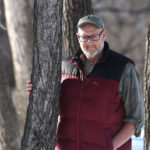Billings’ new city forester: ‘I just want people to appreciate trees as much as I do’
Posted: March 9, 2017Source: Billings Gazette

Picture from Larry Mayer, GazetteStaff
His job title — “city forester” — may sound like a contradiction.
But Steve McConnell, who’s been on the job for the city of Billings for about six weeks, has a good idea how he can help build on Billings’ long history of caring for and about its estimated 90,000 trees.
“Trees are part of the infrastructure of a city, and people take them for granted,” McConnell said Tuesday from his cubicle far from any trees, at the Billings Operations Center. “They are an essential part of our green infrastructure, as opposed to our gray infrastructure,” such as roads, bridges and pipes.
McConnell, who has a doctorate in forestry from the University of Idaho, also studied forestry at the University of Washington and Virginia Tech.
“I just want people to appreciate trees as much as I do,” he said, extolling their virtues: there’s less crime in leafy neighborhoods, traffic is calmed, road rage is eased and people shop longer, spend more and are more willing to travel to stores that are surrounded by trees.
Also, “trees take a lot of particulates out of the air,” replacing them with oxygen, an important function in a town with refineries and other businesses with smokestacks.
“Trees soften the landscape in industrial areas, making it pleasant to look at,” he said.
He’s been compiling and working on a lengthy to-do list, with perhaps the most important task being preparing for the inevitable arrival of the lovely but lethal emerald ash borer.
About 20 percent of the 9,400 trees in city parks are ash trees, and as many as 30 percent of the 80,000 or so trees outside of parks but inside city limits are of that variety, he said.
McConnell has begun work on how to respond when the emerald ash borer — now as close as Colorado — makes its way into Yellowstone County.
He’s also writing a request for proposals to find a consultant “to look at all our public trees and make suggestions on how we can improve our tree planting and tree care, and tell us what we’ve got,” said Jon Thompson, the city’s parks superintendent.
“We have him busy on a number of projects,” said Thompson, noting that it took three rounds of interviews by the Parks, Recreation and Public Lands Department to find McConnell, who was working as a forestry specialist for the Washington State University regional extension service in Spokane, Washington.
McConnell succeeds Fred Bicha, who resigned as Billings’ forester about two years ago.
“The first time we interviewed, the top two candidates dropped out,” Thompson said. “We advertised a second time, and we weren’t happy with the applicants and thought we could do better, so we went out a third time and we found Steve.”
“He is highly educated,” said Parks Director Michael Whitaker. “I think he’ll be able to lead the forestry division full speed ahead.”
Two other division employees, Steve Riley, and Josh Gordon, have been busy this winter pruning trees at city parks.
“A lot of cities don’t invest in that. They end up pruning later in the tree’s life, and it costs more in the long run,” McConnell said. “The dormant season is a great time to prune.”
In addition to the threat of the emerald ash borer, about 1 percent of Billings trees will die every year, McConnell said. He’d like an entrepreneur to be ready to “open a small sawmill that can make something out of that,” he said.
Cities including Madison, Wisconsin, “have pretty good programs for doing that, where several small businesses can make a living on street trees,” McConnell said.
He’s looking to update sections of municipal code having to do with trees and vegetation and to complete an inventory of city-owned trees in rights-of-way.
It may turn out that the city owns even more susceptible ash trees than parks officials imagined.
“We may have an even bigger problem than we thought,” he said.
McConnell said he’s also getting up to speed on Billings’ Arbor Day celebration planned for May 4, when more than 400 fourth-graders are expected to gather at Veterans Park for demonstrations, educational activities, food, tree-planting and general sprucing up.
Already he’s consulted with two Eagle Scout candidates on their tree projects, with a third scout having contacted him Tuesday. “I love doing that kind of stuff,” he said.
Thompson said that Billings, a Tree City USA for more than three decades, is becoming more and more attractive because of its green infrastructure.
“Trees are important to improving our quality of life,” he said. “In this day and age, people are looking for quality of life outdoors and outside of their work, and trees can be just as important as trails providing for that.”
For his part, McConnell said he’s eager to make Billings’ urban forest a more welcoming and healthy place.
“My interest has evolved to providing services that people want,” he said. “As a kid growing up, you think nature is found in the national parks. But it’s where you live, and you want that to be nice, too.”
